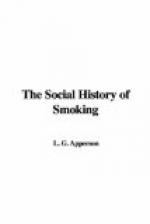Some men seem to act upon Mark Twain’s principle of never smoking when asleep or at meals, and never refraining at any other time. But excess is self-condemned. There is no good reason why anyone, for social or any other reasons, should look askance at the reasonable use of tobacco. “But used in moderation, what evils, let me ask,”—I again quote Dr. Andrew Wilson’s calm good sense—“are to be found in the train of the tobacco-habit! A man doesn’t get delirium tremens even if he smokes more than is good for him; he doesn’t become a debased mortal; there is nothing about tobacco which makes a man beat his wife or assault his mother-in-law—rather the reverse, in fact, for tobacco is a soother and a quietener of the passions, and many a man, I daresay, has been prevented from doing rash things in the way of retaliation, when he has lit his pipe and had a good think over his affairs. Whenever anybody counterblasts to-day against tobacco, I feel as did my old friend Wilkie Collins, when somebody told him that to smoke was a wrong thing. ‘My dear sir,’ said the great novelist, ’all your objections to tobacco only increase the relish with which I look forward to my next cigar!’”
XIII
SMOKING BY WOMEN
Ladies, when pipes are brought,
affect to swoon;
They love no smoke, except
the smoke of Town.
ISAAC HAWKINS BROWNE, circa 1740.
A story is told of Sir Walter Raleigh by John Aubrey which seems to imply that at first women not only did not smoke, but that they disliked smoking by men. Aubrey says that Raleigh “standing in a stand at Sir R. Poyntz’s parke at Acton, tooke a pipe of tobacco, which made the ladies quitt it till he had done.” But this objection, whether general or not, soon vanished, for, as we have seen in a previous chapter, the gallant of Elizabethan and Jacobean days made a practice of smoking in his lady’s presence. It seems certain, moreover, that some women, at least, smoked very soon after the introduction of tobacco; but it is not easy to find direct evidence, though there are sundry traditions and allusions which suggest that the practice was not unknown.
There is a tradition that Queen Elizabeth herself once smoked—with unpleasant results. Campbell, in his “History of Virginia,” says that Raleigh having offered her Majesty “some tobacco to smoke, after two or three whiffs she was seized with a nausea, upon observing which some of the Earl of Leicester’s faction whispered that Sir Walter had certainly poisoned her. But her Majesty in a short while recovering made the countess of Nottingham and all her maids smoke a whole pipe out among them.” The Queen had no selfish desire to monopolize the novel sensations caused by smoking. An eighteenth-century writer, Oldys, in his “Life of Sir Walter Raleigh,” declares that tobacco “soon became of such vogue in Queen Elizabeth’s court, that some of the great ladies, as well as noblemen therein, would not scruple to take a pipe sometimes very sociably.” But these stories rest on vague tradition, and probably have no foundation in fact.




